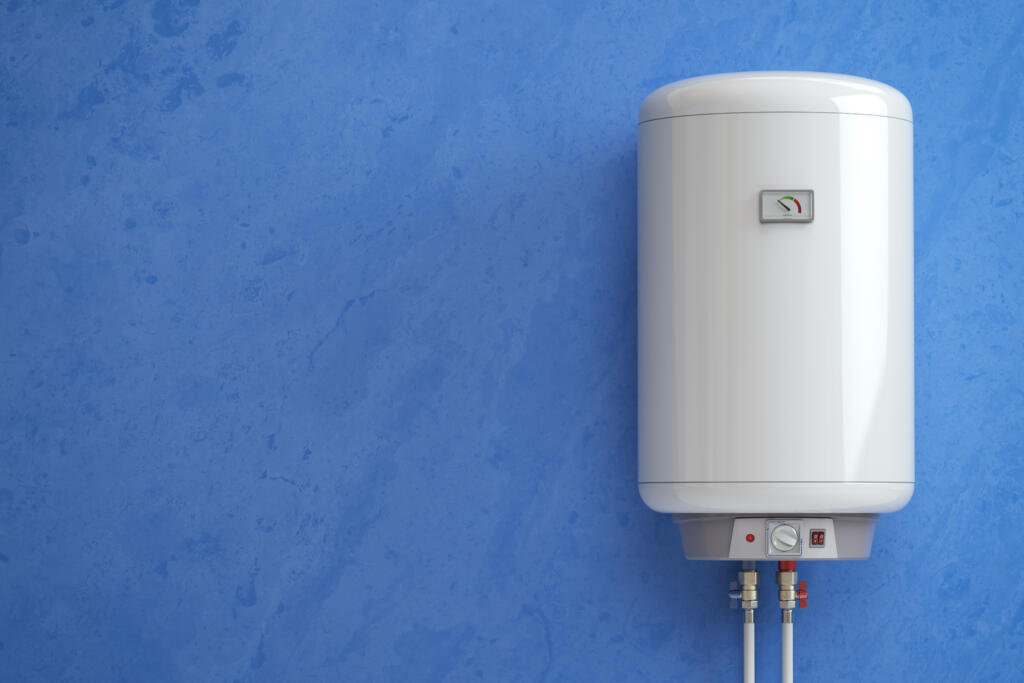You probably don’t think about your home’s water heater very often. As long as you’re getting hot water when you turn on faucets or showers, it must be working properly, right? Well, water heaters like any appliance can become less reliable as they age. And when a water heater fails, it can wind up costing you a lot of money. If you aren’t sure if it’s time to buy a new water heater, search online to find professionals who can help diagnose potential problems.
If you want to avoid costly surprises from your water heater, it’s a good idea to know what signs can indicate a failing water heater. Certain signs can tell you it’s time to buy a new one. Search online to find professionals who offer water heater installation in your area.
 Maxx-Studio / Shutterstock
Maxx-Studio / ShutterstockHere are the steps you should take if you’re wondering whether or not it’s time to replace your home’s water heater.
Check the Age of Your Water Heater
The age of your water heater is the number one way to tell how much life is left in this home appliance. When water heaters reach a certain age, they become increasingly more likely to fail. And if you know how old yours is, you can plan ahead.
Most water heaters have a life expectancy of eight to 12 years.1 The exact service life of your water heater will vary a bit depending on where the unit is installed, how frequently it’s been maintained or repaired, and the quality of your water. However, when your water heater reaches 10 years of service, you’re likely to start noticing problems. At the 10-year mark, leaks and erratic heating tend to happen.
So, if your water heater is getting close to its 10th year of service, it’s time to start looking for a newer model.
Look for Signs of Damage or Wear
If your water heater is acting up or you’re worried it’s due for replacement, you’ll want to inspect it for any signs of damage or wear.
Visible signs of damage or wear can show you potential problems with your water heater. It can also help you determine if your water heater is beyond repair or if it’s costing you too much money.
If you notice any of the following damage, problems, or wear, it’s time for a new water heater.
Leaks
If water is pooling around the base of your water heater or you notice any water corrosion on the sides of the tank, you’ve got a leak. And when your water heater starts leaking, it needs to be replaced immediately.2
Leaks tend to happen when water pressure is no longer being properly regulated inside the tank – and it could lead to a tank explosion.
Knocking Noises
If your water heater is making loud noises that sound like knocking, rumbling, or gurgling, it likely has sediment buildup inside. That sediment hardens as it sits inside your water heater. It’ll cause knocking noises when it moves around.
Cracks or Tiny Holes
If you see any cracks or tiny holes on the exterior of your water heater, you’re likely dealing with brittle metal. As the metal of your water heater becomes brittle, it can begin developing cracks and holes that lead to leaks or rumbling noises. Once that metal is compromised, it’s time to replace it.
A Higher Utility Bill
As water heaters get older, they can become less efficient.3 Serious problems with your water heater can also cause a noticeable increase in your monthly utility bills. For example, your water heater might need to use more gas or electricity to heat water. Sediment buildup can also make water heaters less efficient and more expensive to operate.
The easiest and quickest way to deal with these problems? Hire a professional. Search online to find local experts who can replace or repair water heaters, and you can have a new water heater installed in no time.
Check the Color and Temperature of Your Water
It’s also important to check the water inside – and outside – of your water heater to see if it’s still working properly.
When your water heater isn’t functioning properly, it can actually change the water inside as it heats. You want to make sure that there isn’t any rusty water inside the water heater.4 That’s a sign that your water heater may be rusting from the inside out. Therefore, it may spring a leak soon.
Additionally, when you turn on the hot water throughout your home, assess the temperature. Is it taking longer than usual to heat up? Is the water not getting as hot – or potentially not hot or warm at all? These can be indicators that your water heater is failing to work.
Get a Professional Water Heater Check-Up
If you really want to know whether or not it’s time to replace your water heater, you need a professional’s help. You can take all of the guesswork out of looking for signs and symptoms of a bad, aging water heater – instead, have an expert give it a look over. Search online to find professionals in your local area who can give your water heater a checkup and offer you professional advice about what to do next.
You can also have a professional remove your old water heater and install a new one. Local professionals can give you recommendations on the most efficient and long-lasting water heaters, which will help you get years of value out of your next water heater. And they can tackle the hard work for you, saving you time and potentially money on both a new water heater and your utility bills.